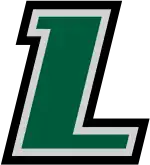Johns Hopkins–Loyola lacrosse rivalry
The Johns Hopkins–Loyola lacrosse rivalry is an intercollegiate lacrosse rivalry between Baltimore City's Johns Hopkins Blue Jays and Loyola Greyhounds. The teams first met in 1939, when Hopkins prevailed with a score of 20–1.[1]
| First meeting | 1939 Johns Hopkins 20, Loyola 1 |
|---|---|
| Latest meeting | February 18, 2023 Loyola 13, Johns Hopkins 8 |
| Statistics | |
| Meetings total | 59 |
| All-time series | Johns Hopkins leads, 49–10 |
| Largest victory | Johns Hopkins, 29–3 (1959) |
| Longest win streak | Johns Hopkins, 30 (1939–1993) |
| Current win streak | Loyola, 1 (2023–Present) |
The series is known as both the "Charles Street Massacre" and the "Battle of Charles Street," depending on the school. Hopkins fans use the term "Charles Street Massacre" to refer to the historically lopsided on-field results and its continued dominance in the series.[2][3] Loyola fans and some media outlets refer to the game using the more neutral sounding "Battle of Charles Street." Johns Hopkins won 31 straight meetings until Loyola finally snapped the streak with a victory of its own in 1994.[4] Both schools' campuses are located adjacent to Charles Street, which runs north-to-south through the city of Baltimore. Both teams maintain similar cross-street series with the Towson Tigers (see Loyola–Towson lacrosse rivalry).
After the Blue Jays' 29th consecutive victory in 1969, Loyola dropped Hopkins from its schedule.[5] Loyola was an NCAA Division II program from 1973 to 1982 when it moved to I, while Johns Hopkins was Division I during that period. Subsequently, there was a 24-year hiatus in the series before its renewal in 1992.[6] The Baltimore Sun asserted that in the later years before its revival, Johns Hopkins wished to avoid Loyola, as its team had grown significantly more competitive.[5]
After its first victory in 1994, Loyola won again in 1998 and 1999. All three Loyola wins came under the guidance of head coach Dave Cottle. In the 1998 game, the Greyhounds set a school record of eleven consecutive wins by beating Johns Hopkins.[7] Loyola (#1) entered the contest on April 28, 2012 ranked ahead of Hopkins (#10), but lost a 10–9 overtime decision at the Ridley Athletic Complex.[8] This loss was the Greyhounds' only blemish on its first-ever national championship season.[9]
Rival Accomplishments
The following summarizes the accomplishments of the two programs.
| Team | Johns Hopkins Blue Jays | Loyola Greyhounds |
|---|---|---|
| Pre-NCAA National Titles | 35 | 0 |
| NCAA National Titles | 9 | 1 |
| NCAA Final Four Appearances | 29 | 5* |
| NCAA Tournament Appearances | 47 | 26* |
| NCAA Tournament Record | 71–38 | 17–25* |
| Conference Tournament Titles | 2 | 6 |
| Conference Championships | 2 | 10 |
| Tewaarton Award Recipients | 1 | 1 |
| Lt. Raymond Enners Award Recipients | 11 | 1 |
| Consensus First Team All-Americans | 184 | 17 |
| All-time Program Record | 993–356–15 | 537–408–7 |
| All-time Winning Percentage | .739 | .568 |
- Loyola's 1979 and 1981 NCAA tournament appearances came at the Division II level.
Game Results
| Johns Hopkins victories | Loyola victories | Tie games |
| ||||||||||||||||||||||||||||||||||||||||||||||||||||||||||||||||||||||||||||||||||||||||||||||||||||||||||||||||||||||||||||||||||||||||||||||||||||||||||||||||||||||||||||||||||||||||||||||||||||||||||||||||||||||||||||||||||||||||||||||||||||||||||||||||||||||||||||||||||||||||||||||||||||||||||||||||||||||||||||||||||||||||
References
- "All-Time Series Records", 2009 Johns Hopkins Men's Lacrosse Media Guide, p. 98, Johns Hopkins University, 2010.
- Hopkins down, but not out; If Blue Jays can get to .500, there’s a chance they could compete in NCAA tournament, The Baltimore Sun, April 27, 2010.
- HOPKINS RAPS LOYOLA, 19-1; Lacrosse Game Mismatch From Start To Finish Archived 2012-11-03 at the Wayback Machine, The Baltimore Sun, May 1, 1963.
- Loyola conquers Hopkins hex Archived 2012-11-03 at the Wayback Machine, The Baltimore Sun, p. 1C, May 8, 1994.
- LACROSSE NOTEBOOK The Fleet Classic: Where Elite Meet, Newsday (Long Island, NY), March 19, 1992.
- Hopkins still too much for Loyola 1st game in 24 years goes to Jays, 16-11, The Baltimore Sun, April 22, 1993.
- Loyola turns tables on Hopkins, 10-7; Defense-led Greyhounds topple No. 3 Blue Jays, get record 11th straight win, The Baltimore Sun, May 3, 1998.
- "Last Second Overtime Goal Lifts No. 10 Hopkins Over No. 1 Men's Lax," Loyola University Maryland Athletics, Saturday, April 28, 2012.
- "NCAA CHAMPS! Loyola Wins First NCAA Lacrosse Title, 9–3, Over Terps," Loyola University Maryland Athletics, Monday, May 28, 2012.
- "Johns Hopkins University Men's Lacrosse Record Book". Retrieved 10 March 2019.

